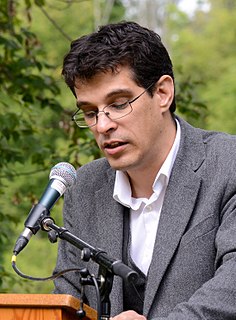A Quote by Hannah Arendt
No civilization would ever have been possible without a framework of stability, to provide the wherein for the flux of change. Foremost among the stabilizing factors, more enduring than customs, manners and traditions, are the legal systems that regulate our life in the world and our daily affairs with each other.
Related Quotes
The separation of church and state is extremely important to any of us who holds to the original traditions of our nation. . . . To change these traditions . . . would be harmful to our whole attitude of tolerance in the religious area. If we look at situations which have arisen in the past in Europe and other world areas, I think we will see the reason why it is wise to hold to our early traditions.
Because civilization isn't a thing that you build and then there it is, you have it forever. It needs to be built constantly, recreated daily. It vanishes far more quickly than he ever would have thought possible. And if he wishes to live, he must do what he can to prevent the world he wants to live in from fading away. As long as there's war, life is a preventative measure.
What we would like to do is change the world - make it a little simpler for people to feed, clothe, and shelter themselves as God intended for them to do....We can, to a certain extent, change the world; we can work for the oasis, the little cell of joy and peace in a harried world. We can throw our pebble in the pond and be confident that its ever widening circle will reach around the world. We repeat, there is nothing that we can do but love, and, dear God, please enlarge our hearts to love each other, to love our neighbor, to love our enemy as well as our friend.
There has been a good deal of comment — some of it quite outlandish — about what our postwar requirements might be in Iraq. Some of the higher end predictions we have been hearing recently, such as the notion that it will take several hundred thousand U.S. troops to provide stability in post- Iraq, are wildly off the mark. It is hard to conceive that it would take more forces to provide stability in post-Saddam Iraq than it would take to conduct the war itself and to secure the surrender of Saddam's security forces and his army — hard to imagine.
Our manners have been corrupted by communication with the saints. Our hymn-books resound with a melodious cursing of God and enduring Him forever. One would say that even the prophets and redeemers had rather consoled the fears than confirmed the hopes of man. There is nowhere recorded a simple and irrepressible satisfaction with the gift of life, any memorable praise of God.
I can’t think of any greater happiness than to be with you all the time, without interruption, endlessly, even though I feel that here in this world there’s no undisturbed place for our love, neither in the village nor anywhere else; and I dream of a grave, deep and narrow, where we could clasp each other in our arms as with clamps, and I would hide my face in you and you would hide your face in me, and nobody would ever see us any more.
The way we live our daily lives is what most effects the situation of the world. If we can change our daily lives, then we can change our governments and can change the world. Our president and governments are us. They reflect our lifestyle and our way of thinking. The way we hold a cup of tea, pick up the newspaper or even use toilet paper are directly related to peace.
The further conquest of space will make it possible, for example, to create systems of satellites making daily revolutions around our planet at an altitude of some 40,000 kilometers, and to assure universal communications and the relaying of radio and television transmissions. Such an arrangement might prove more useful, economically, than the construction of radio relay systems over the whole surface of the earth. The great accuracy of movement of these satellites will provide a reliable basis for solving navigational problems
Britain has always been a good citizen in the world. We rightly provide a safe haven for people fleeing political persecution by brutal regimes. Our legal system is often seen as a beacon for the rest of the world, with people coming from all over to study it and embed its principles into their own systems.
Since it is possible that thou mayest depart from life this very moment, regulate every act and thought accordingly. But to go away from among men, if there are gods, is not a thing to be afraid of, for the gods will not involve thee in evil; but if indeed they do not exist, or if they have no concern about human affairs, what is it to me to live in a universe devoid of gods or devoid of Providence? But Gods there are, undoubtedly, and they regard human affairs; and have put it wholly in our power, that we should not fall into what is truly evil.
The First Amendment reads more like a dream than a law, and no other nation, so far as I know, has been crazy enough to include such a dream among its fundamental legal documents. I defend it because it has been so successful for two centuries in preserving our freedom and increasing our vitality, knowing that all arguments in support of it are certain to sound absurd.
Have you ever considered, beloved other, how invisible we are to each other? We look at each other without seeing. We listen to each other and hear only a voice inside out self. The words of others are mistakes of our hearing, shipwrecks of our understanding. How confidently we believe OUR meanings of other people's words.







































